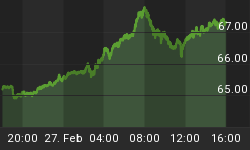Please don't believe the hype that the American economy is healing. While it is true that some data is showing improvement, the true fundamentals of the economy continue to erode.
America's trade deficit hit $52.6 billion in January. That's the highest level since October of 2008 and is clear evidence that we have fully reverted back to our under production, under saving and overconsumption habits with alacrity.
The nation's debt has now eclipsed 100% of our GDP, after 13 straight quarters of paying down debt households have now started to releverage their balance sheets and total non-financial debt is at a record 250% of GDP. The sad truth is that the U.S. economy is more addicted to debt than at any other time in history.
But most importantly, please don't believe the lie that the Fed's money printing is laying fallow at the central bank and that inflation isn't harming the American middle class and the economy. Consumer prices rose 0.4% in the month of February alone and year over year increases in food and gas prices are 5% and 12% respectively. Money supply growth is up 10% in the past 12 months and banks are now buying U.S. Treasuries with reckless abandon.
Commercial banks have purchased $78.2 billion in Treasury and Agency debt in January and February of 2012. That's already more than the entire amount of purchases made in all of 2011 and is on track to add nearly ½ trillion dollars of government debt to commercial banks' balance sheets. The Fed buys these Treasuries from banks and that enables them to buy more debt from the government. Using that process, the Fed is able to monetize both existing and newly issued Treasury debt. Since the government gets the money first and distributes it into the economy, the money supply increases without any direct benefit of capital goods creation.
Making this situation even worse is the Fed's promise to keep interest rates on hold for another three years. Banks can either keep their newly created credit at the Fed earning .25% or give a three year loan to the government and earn .57% at the current interest rate. Since Bernanke has assured them that there is little risk of rates going up on the short end of the yield curve for at least the next 36 months, banks have made the intelligent choice to earn the extra yield and buy 3 year notes.
That is a big win for the banks because they can earn an extra 32 basis points on their money. And it's a major score for the government because they have a ready buyer for their debt. However, it's a big loss for the middle class, as they see their cost of living soar due to the relentless increase in money supply.
So there you have it! The American economy isn't healing at all. What we have accomplished is to further cement our addictions to debt, over consumption and inflation. Those very same conditions were the progenitors of the Great Recession beginning in December of 2007. Oil prices are soaring above $100 a barrel, inflation is rising and households are still soaked in debt...sound familiar? Only now the nation's sovereign debt is at a record level and the country is careening towards insolvency. The only thing holding the economy together is the Fed's promise of free money forever. That shouldn't be misconstrued as a viable and healthy economy.















